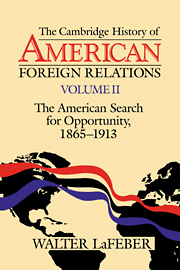Book contents
- Frontmatter
- 1 Springboards and strategies
- 2 The second Industrial Revolution at home and abroad
- 3 Race for empire
- 4 “America Will Take This Continent in Hand Alone”
- 5 Crossing the oceans
- 6 1893–1896: chaos and crises
- 7 The empire of 1898 – and upheaval
- 8 Pacific empire – and upheaval
- 9 Theodore Roosevelt: conservative as revolutionary
- 10 William Howard Taft and the age of revolution
- Conclusion: The 1865–1913 Era Restated
- Bibliographic Essay
- Index
- THE CAMBRIDGE HISTORY OF AMERICAN FOREIGN RELATIONS
- References
Conclusion: The 1865–1913 Era Restated
Published online by Cambridge University Press: 28 March 2008
- Frontmatter
- 1 Springboards and strategies
- 2 The second Industrial Revolution at home and abroad
- 3 Race for empire
- 4 “America Will Take This Continent in Hand Alone”
- 5 Crossing the oceans
- 6 1893–1896: chaos and crises
- 7 The empire of 1898 – and upheaval
- 8 Pacific empire – and upheaval
- 9 Theodore Roosevelt: conservative as revolutionary
- 10 William Howard Taft and the age of revolution
- Conclusion: The 1865–1913 Era Restated
- Bibliographic Essay
- Index
- THE CAMBRIDGE HISTORY OF AMERICAN FOREIGN RELATIONS
- References
Summary
The historiography of 1865–1913 has been heavily influenced by the belief that Americans sought order and stability, acted as an antirevolutionary force, and – notably for some who were undergoing supposed “psychic crises” – searched for a return to supposedly more settled, precorporate times. The influential work of Richard Hofstadter, Robert Wiebe, and biographers of Theodore Roosevelt (especially John Morton Blum and Howard K. Beale) have made the argument for writing the history with some, if not all, of these characteristics.
Such themes may have characterized important parts of the domestic society and policy in the Gilded Age and early Progressive Era. They had little to do with foreign affairs. Nor do they characterize the officials who made overseas policy. The central theme of post-1865 U.S. history is that the nation developed into a great world power, one of the four greatest militarily and the greatest of all economically. These years ushered in the American Century. At the same time, however, major revolts occurred across much of the globe – in Russia, China, Mexico, Cuba, Nicaragua, the Philippines, Panama, El Salvador, and Hawaii, among other places. The rise of the United States to the status of great world power was not dissociated from the causes of these revolutions. American policy played some role in all of these outbreaks, and in most it was a determinative force.
- Type
- Chapter
- Information
- The Cambridge History of American Foreign Relations , pp. 234 - 239Publisher: Cambridge University PressPrint publication year: 1993



